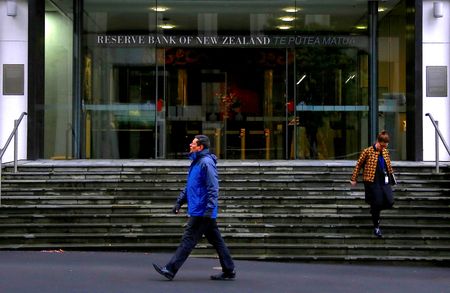By Lucy Craymer
WELLINGTON (Reuters) – New Zealand’s consumer inflation smashed expectations in the third quarter with price gains becoming more broad-based and entrenched, prompting analysts to bet on a more aggressive central bank rate hike next month and a higher peak for rates.
Annual inflation ran at 7.2% in the third quarter, sitting just below a three-decade high, Statistics New Zealand said in a statement on Tuesday. Inflation slowed slightly from 7.3% in the second quarter but far outpaced expectations in a Reuters poll for a 6.6% annual rise.
On a quarter-on-quarter basis, the consumer price index (CPI) rose 2.2%, following a 1.7% increase in the second quarter and beating expectations for a 1.6% rise.
“Inflation is much too high and is becoming increasingly engrained,” said Mark Smith, senior economist at ASB Bank.
“With the RBNZ having the inflation bit between its teeth, all options are likely to remain on the table.”
Smith said they had changed their OCR forecast and were now expecting a 75-basis-point rate hike in November, and two further 50 bp rate hikes in February and April 2023.
Earlier in October, the Reserve Bank of New Zealand (RBNZ) raised its official cash rate by 50 basis points to 3.5%, the fifth such outsized move and the eighth hike in 12 months.
Analysts at ANZ also updated their OCR forecasts and were now expecting a 75bp hike in both November and February before a pause. This would take the rates peak to 5%, compared with 4.75% previously.
The New Zealand dollar rose 0.5% after the data.
The main drivers of the 7.2% annual inflation were rising prices for construction, local government taxes and rentals for housing, Statistics New Zealand said in a statement.
“The cost to construct a new house has continued to rise with supply-chain issues, labour costs and higher demand, all of which combine to push up prices,” said Nicola Growden, Statistics New Zealand prices senior manager.
Statistics New Zealand added that annual non-tradable inflation – products made in New Zealand for domestic consumption – rose 6.6%, the highest since it began tracking that data in June 2002.
The RBNZ has raised interest rates by 325 basis points since October last year. It has signaled it will increase the cash rate further as it works to dampen inflation.
(Reporting by Lucy Craymer; Editing by Chris Reese, Bill Berkrot and Ana Nicolaci da Costa)

